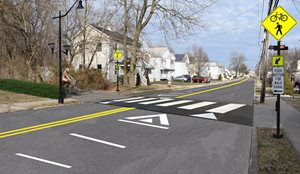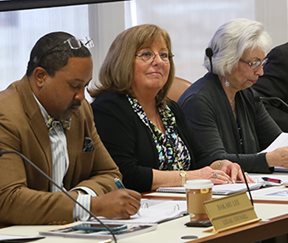March 2020
Posted: 3/24/2020 11:22:21 AM
As part of NJTPA’s efforts to update its long range transportation plan looking out to the year 2050, it has invited speakers to present on key topics to Board and committee meetings. The most recent was a presentation at the March 9 Board meeting on Electric Vehicle Programs Available to Local Governments by Andrea Friedman, Supervisor, New Jersey Department of Environmental Protection. You can view the presentation below.
Posted: 3/11/2020 2:51:56 PM
 Eight municipalities will receive up to $10,000 in technical assistance for complete streets projects ranging from workshops on walkability to bicycle network plans, conceptual designs and safety assessments, the North Jersey Transportation Planning Authority (NJTPA) announced today. The municipalities selected through the competitive application process are:
Eight municipalities will receive up to $10,000 in technical assistance for complete streets projects ranging from workshops on walkability to bicycle network plans, conceptual designs and safety assessments, the North Jersey Transportation Planning Authority (NJTPA) announced today. The municipalities selected through the competitive application process are:
- Bergen County: Hackensack City - Walkable Community Workshop
- Essex County: West Orange Township - Walkable Community Workshop
- Middlesex County: Cranbury Township - Bicycle Corridor or Network Plan
- Middlesex County: Dunellen Borough - Walkable Community Workshop
- Monmouth County: Bradley Beach Borough - Complete Streets Conceptualizations
- Somerset County: Franklin Township - Crime Prevention Through Environmental Design Safety Audit and Site Assessment
- Somerset County: Manville Borough - Bicycle Corridor or Network Plan
- Union County: Garwood Borough - Bicycle Corridor or Network Plan
“This is a great program that helps advance complete streets initiatives to make roads safer for people walking, bicycling, driving and taking transit. Congratulations to the selected municipalities. I look forward to seeing them turn their complete streets visions into reality with our help,” said NJTPA Executive Director Mary D. Ameen.
Sustainable Jersey and the Alan M. Voorhees Transportation Center (VTC) at Rutgers University provide the technical assistance, which is financed through the NJTPA’s federal funding from the U.S. Department of Transportation. Activities include:
- Bicycle Corridor or Network Plan: Help identifying specific routes and road treatments to improve bicycling infrastructure.
- Complete Streets Conceptual Rendering: Graphic renderings to help visualize potential improvements to streetscapes or public spaces.
- Crime Prevention through Environmental Design (CPTED) Safety Audit and Site Assessment: A workshop and street audit to assist a municipality in assessing and understanding potential physical improvements that could help prevent crime.
- Walkable Community Workshop: A workshop and audit of up to a half-mile of street to identify potential pedestrian and bicycle improvements.
“These towns will receive valuable hands-on guidance to move their complete streets projects forward,” said Renee Haider, associate director of Sustainable Jersey. “This important work, done by our communities, contributes to our mission to create a more sustainable New Jersey.”
Complete streets are streets designed for all users, all modes of transportation and all ability levels. They balance the needs of drivers, pedestrians, bicyclists, transit riders, emergency responders and goods movement based on local context. “Since every municipality has different needs, we will provide technical assistance to help advance complete streets by documenting existing conditions, exploring opportunities for improvement and providing recommendations,” said Jon A. Carnegie, AICP/PP, executive director of the Alan M. Voorhees Transportation Center at Rutgers, The State University of New Jersey.
This is the second time the NJTPA is offering technical assistance to municipalities. Nine projects were completed in 2019 and final reports are available on
NJTPA’s complete streets webpage. The NJTPA, Sustainable Jersey and VTC also conducted a series of workshops to help municipalities implement complete streets.
Posted: 3/10/2020 11:44:26 AM
 During her two years as Chair of the NJTPA Board of Trustees, Morris County Freeholder Kathryn DeFillippo plans to focus on safety, reliability and accessibility.
During her two years as Chair of the NJTPA Board of Trustees, Morris County Freeholder Kathryn DeFillippo plans to focus on safety, reliability and accessibility.
Chair DeFillippo shared her priorities at the Board’s March 9 meeting and thanked her fellow Board members for always working in a bipartisan manner to get things done for northern and central New Jersey.
Our region depends on a reliable and efficient transportation system. It’s critical to attracting employers to our state and enhancing quality of life by providing safe transportation to all travelers, regardless of their age, income, ability, or mode of choice,” she said.
She said its important that older populations and people with disabilities have transportation options regardless of where they live. In addition, the transportation system must connect workers with their places of employment. This is particularly important at businesses that have round-the-clock operations, Chair DeFillippo said.
She said safety will continue to be a top priority for the agency, and that will be reflected in the next long-range plan, which the NJTPA is beginning to develop this year. The board is set to adopt a plan update in fall 2021. The plan must also consider the role of autonomous vehicles and other emerging technologies, she said.
Chair DeFillippo said the NJTPA will continue to work to expand its Street Smart NJ pedestrian safety program, which has partnered with more than 125 communities. “New Jersey’s pedestrian fatality rate is nearly double the national average, and we must continue to work to reduce this number,” she said.
She also spoke about the need to focus on freight, which plays a critical role in the region’s economy.
“Congestion remains a major concern not only for the freight sector, but also for the travelling public,” she said. “Improving transit and supporting alternative modes, such as cycling and walking, can help address this.”
She said she would continue the NJTPA’s support for federal funding for the Hudson Tunnel Project, which will preserve capacity and improve resiliency on the Northeast Corridor between New York and New Jersey.
“We have a lot of work ahead of us, but I know that we can do great things working together,” she said.